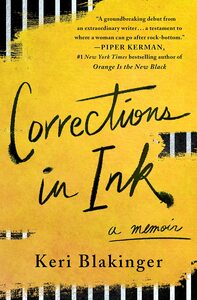Take a photo of a barcode or cover
Rounding up from 3 stars because it’s amazing the author was able to get clean, get out of prison, and turn her life around. Would have liked more detail into why these things happened rather than factual retelling.
This is a well-written account of the dizzying downfall of an athletically-gifted young woman. Blakinger spirals into a serious addiction after a major disappointment in her promising skating career. Eventually, she's busted for drugs, and spends a couple years in prison. But in the end, she turns her experience into a career as an investigative journalist, working the prison beat. Her hard work and research leads to articles exposing abuses in the criminal justice system, which then leads to action to address these conditions. It's an admirable and compelling story. The writing is good, though there's a qualitative difference in tone from the first half (competitive skating to the drug addiction) to the second half (serving time in prison and becoming a journalist). It feels like the author lacked empathy toward her younger self, writing of these years in a glib, hip quasi-literary lingo with a matter-of-fact stance. This half lacks the thoughtful reflection and context of the second half. In sheer speculation, I wonder if the author employs (consciously or not) this narrative distance out of a sense of shame, regret or self-anger/alienation toward her younger self. Or perhaps in prison, with a clearer head, the author could be more reflective (then, and thus in the writing later). The writing is good, but like a lot of memoirs I read by journalists, it lacks certain literary techniques that could deepen reader engagment -- portraiture, scene, better setting details. Insead, the narrative races forward horizontally, with the author telling what happened instead of dropping into moments to illuminate them. The narrative is thus glancing and less penetrating. One authorial tic that drove me crazy: the use of "sure." Sure, it was used often, and sure, writers do this sometimes, and sure, it's a strategy for prolepsis, and sure, I'm being picky here, but sure, reading the narrative aloud would have exposed this annoying repetition. Overall, though, well worth reading.
Keri is a journalist to follow if you want to see justice and reform in our criminal justice system. I'm impressed with her activism to help others. Her work provides a critical eye to people incarcerated in the U.S. that many just wrongly want to ignore.
emotional
hopeful
informative
inspiring
fast-paced
"The whole premise of prison began to seem
absurd: Locking hundreds of traumatized
and damaged women in together and
threatening them constantly with additional
punishments is not rehabilitation. It is not
corrections. It is not public safety. It is
systemic failure."
-Keri Blakinger
Corrections in Ink
absurd: Locking hundreds of traumatized
and damaged women in together and
threatening them constantly with additional
punishments is not rehabilitation. It is not
corrections. It is not public safety. It is
systemic failure."
-Keri Blakinger
Corrections in Ink
This was kind of like Orange is the new black with an female inmate going to jail/prison for a drug charge and how she changed her life while in jail and helped others when she got out.
I really like Keri Blakinger's writing and think it is a very good depiction of the harms of jails and prisons and what really happens -- re: not something rehabilitative that provides for a way to make it after release. I'm glad she sheds light on the power dynamic and threat of sanctions that occur and peoples' abuse of that power & the difficulty in advocating for yourself while in jail or prison, or going to an ombudsman. When staying silent is the best solution to injustices due to fear of repercussions or retaliation, that's not good (and that is the nicest way of saying it).
I was waiting for her to identify how this is really, a view from an individual who is privileged, and I'm glad she finally said it. I did keep thinking to myself throughout the book, as someone who is also privileged, that this would not have been the same had she been a woman of color, a man of color, LGBTQIA, and in particular, if she did not have a support system behind her. She is one of the lucky ones, but as she says, that shouldn't just apply to her. Everyone should be granted this opportunity and I look forward to reading more from her.
I was waiting for her to identify how this is really, a view from an individual who is privileged, and I'm glad she finally said it. I did keep thinking to myself throughout the book, as someone who is also privileged, that this would not have been the same had she been a woman of color, a man of color, LGBTQIA, and in particular, if she did not have a support system behind her. She is one of the lucky ones, but as she says, that shouldn't just apply to her. Everyone should be granted this opportunity and I look forward to reading more from her.
Extremely raw and eye opening memoir. Keri writes about her time in prison after she was arrested for drug dealing. She was a Cornell student and ice skater who had her life turned upside down after drugs.
I started following Keri on Twitter for her constant reporting on prisons in America and was looking forward to getting my hands on her memoir. She did not disappoint. It was yet another reminder of how important journalists' work is, and how absolutely flawed the prison system is. She was privileged enough to get out, get a second chance, and is now able to tell the stories of those who may not. I'll read anything she writes.





